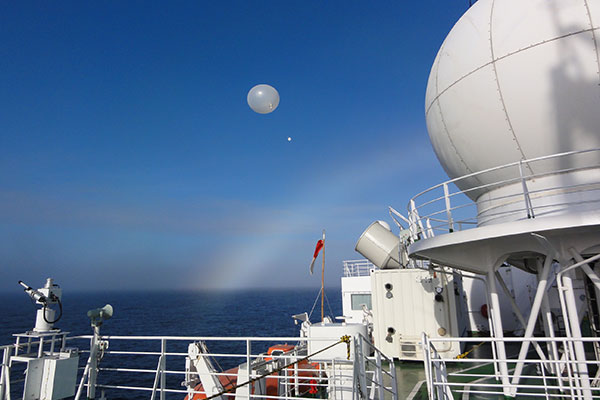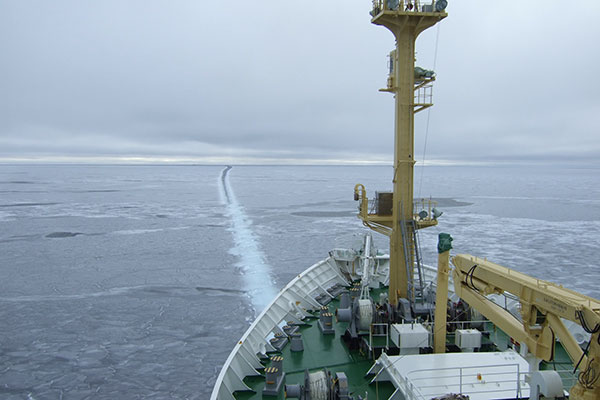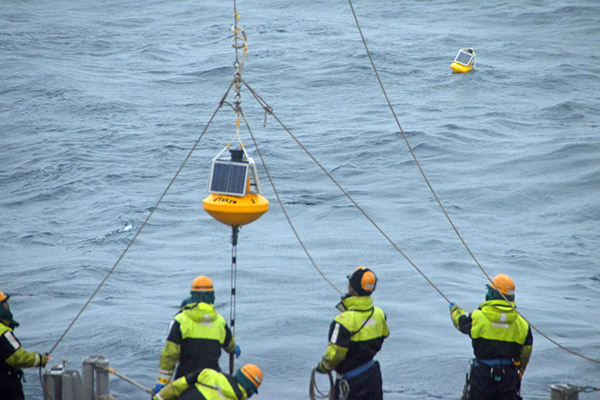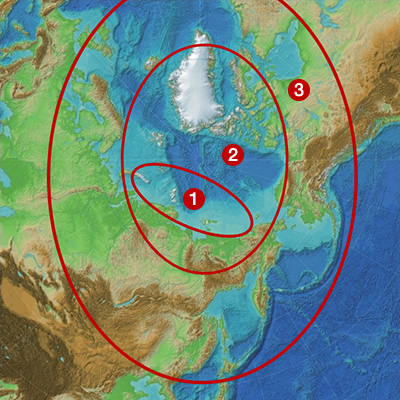Theme 1
Predictability study on weather and sea-ice forecasts linked with user engagement

PI : Jun Inoue (NIPR)
Study Sites : Arctic, and midlatitudes
Background of the Research
The Northern Sea Route (NSR) could be an attractive shipping route during the Arctic ice-free period, contributing to socio-economic activities between European and Asian countries. The decline in the Arctic sea ice extent, however, could cause extreme weather phenomena locally and remotely (e.g., cyclonic storms disturbing ship navigation along the NSR, and severe cold winter over the continental land masses). Therefore, accurate weather and sea-ice forecasts are desirable, although there are large uncertainties in current forecasts due to the sparse observational network in the Arctic. The World Meteorological Organization (WMO) has initiated the Polar Prediction Project (PPP), whose mission is to "Promote cooperative international research enabling development of improved weather and environmental prediction services for the polar regions, on time scales from hours to seasonal." Our research activities aim to add a valuable contribution to a sustainable Arctic observation network and socio-economic benefits.
Overview of the Research
To improve the skills of weather and sea ice forecasts over the Arctic region, international collaborative research will be conducted linking several international projects (PPP, S2S, etc.). There are three research themes: (1) intensive Arctic observations during the Year of Polar Prediction (YOPP) and observation system experiments based on a data assimilation technique; (2) predictability studies on weather extremes associated with the Arctic mid-latitude climate linkages by using the dataset from the Subseasonal to Seasonal (S2S) project; and (3) short-term sea-ice prediction and development of navigation support systems and a wave-ice interaction model for the Northern Sea Route. These observational and numerical studies will contribute to a comprehensive understanding of polar predictabilities. We will use research vessels to make atmospheric measurements and deploy wave buoys, and validate the impact of observations on weather and sea ice forecasts by using numerical experiments.

Radiosonde observations from RV Mirai

RV Mirai cautiously nosing her way through a thin ice area

Waves In Ice (WII) Buoys deployed during R/V Mirai Arctic cruise 2016
Cooperative Institutions / International Projects
Alfred Wegener Institute (Germany), Norwegian Polar Institute (Norway), Korean Polar Research Institute (Korea), Environment Canada (Canada)
World Weather Research Programme - Polar Prediction Project (WWRP-PPP)
Implementation Structure
| Members | |
|---|---|
| Name | Institutes |
| Jun Inoue | National Institute of Polar Research |
| Hajime Yamaguchi | The University of Tokyo |
| Takuji Waseda | The University of Tokyo |
| Mio Matsueda | University of Tsukuba |
| Takeshi Tamura | National Institute of Polar Research |
| Tomoko Koyama | National Institute of Polar Research |
| Masatake Hori | National Institute of Polar Research |
| Tsubasa Kodaira | The University of Tokyo |
| Liyanarachchi Waruna Arampath De Silva | The University of Tokyo |
| Takehiko Nose | The University of Tokyo |
| Akio Yamagami | University of Tsukuba |
| Collaborators | |
|---|---|
| Name | Institutes |
| Genki Sagawa | WEATHERNEWS INC. |
| Natsuhiko Otsuka | Hokkaido University |
| Toshihiro Ozeki | Hokkaido University of Education |
| Satoru Adachi | NIED |
| Amin Chabchoub | The University of Sydney |
| Adrean Webb | Kyoto University |
| Kazutaka Tateyama | Kitami Institute of Technology |
| Kazutoshi Sato | Kitami Institute of Technology |
| Daiki Nomura | Hokkaido University |
| Noriaki Kimura | The University of Tokyo |
| Jun Ono | JAMSTEC |
| Akihisa Konno | Kogakuin University |
| Jyunji Sawamura | Osaka University |
| Takatoshi Matsuzawa | NMRI |
| Toshiyuki Takagi | National Institute of Technology, Kushiro College |
| Takumi Matsunobu | University of Tsukuba |
| Takuya Nakanowatari | Hokkaido National Fisheries Research Institute |
| Koji Shimada | Tokyo University of Marine Science and Technology |
| Jumpei Yamamoto | Tokyo University of Marine Science and Technology |
| Chisa Kiyabu | Tokyo University of Marine Science and Technology |
| Rio Maya | Tokyo University of Marine Science and Technology |
| Eri Yoshizawa | Korea Polar Research Institute |
Study Sites (Map)
- ❶Northern Sea Route (NSR)
- ❷Arctic Region
- ❸Mid- and High-latitudes

ArCS Blog
- Workshop on observational campaigns and weather forecasts (July 01, 2019)
- ArCS Theme 1&7 Joint Symposium, Changing Arctic and human society (June 11, 2019)
- YOPP supports the Japanese Arctic field campaign; Users feedback to operational services (MIRAI Arctic cruise 2018) (November 29, 2018)
- A role of Year of Polar Prediction on a sustainable Arctic observing network (July 16, 2018)
- Chukchi Sea Radiosondings help detecting Hurricane Irma (November 28, 2017)
- Arctic sea-ice forecast of this summer has released (July 06, 2017)
- Open Seminar on the Northern Sea Route from the Latest Arctic Research Works (April 06, 2017)




